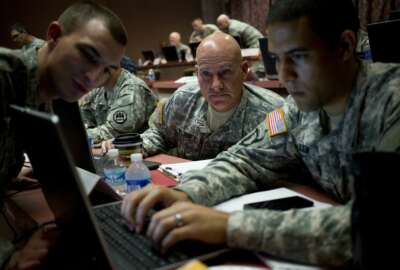
Government cyber incidents continue downward trend
In today's Federal Newscast, the number of cybersecurity incidents across government is down for a second straight year.
To listen to the Federal Newscast on your phone or mobile device, subscribe in PodcastOne or Apple Podcasts. The best listening experience on desktop can be found using Chrome, Firefox or Safari.
- The number of cybersecurity incidents across government is down for a second straight year. The good news is agencies faced fewer cyber attacks in fiscal 2019 as compared to 2018 and 2017. The bad news, the type of attacks they are facing like brute force attempts are getting more complex. In the latest Federal Information Security Management Act or FISMA report to Congress, OMB says agencies faced less than 29 thousand overall cyber incidents last year down from more than 31 thousand the year before. OMB also found more agencies are managing their cyber risks at a more advanced state than previously.
- Democrats on the House Veterans Affairs Committee want more answers on how VA is granting telework and leave to its employees. The members have heard from VA employees who say they’ve been denied telework or leave during the pandemic. Members say decisions for granting leave or telework requests lie with VA supervisors. That’s because the department has been issuing guidance instead of directives. Committee Chairman Mark Takano wrote to VA Secretary Robert Wilkie looking for more details on the department’s telework and leave policies.
- A backlog of disability claims may be piling up at the Department of Veterans Affairs due to the pandemic. House members say 200,000 disability exams for veterans have been impacted by the pandemic. VA canceled in-person compensation and pension exams in early April. The department can conduct some exams virtually. But VA has some limitations on the kinds of virtual screenings it can conduct. The decision to cancel in-person exams also created some confusion for veterans who missed their original appointments and may have to file an appeal. House members fear VA will face a backlog of disability claims once in-person exams return. VA tells Congress, in-person exams could come back next month under a phased reopening plan.
- A soldier died from coronavirus bringing the death toll from the disease for service members up to three. The military has had a low mortality rate with COVID-19 considering nearly 6,200 service members have been infected to date. Thirty five people related to the military have died from the disease. That includes civilians working for the Defense Department, service members, their dependents and contractors.
- The Navy has finished its latest investigation into the coronavirus outbreak aboard the U.S.S. Theodore Roosevelt. But it’ll be a while before the public learns the results. Among the questions still tied up by the investigation is whether Capt. Brett Crozier will be returned to his position as commander of the Roosevelt. It’s also possible the review will assign accountability to more senior officers. Navy officials delivered the latest report to the chief of naval operations yesterday, but they say it will take time for Adm. Michael Gilday to review its contents. An earlier report recommended that Crozier be restored to his position as the Roosevelt’s skipper, but James McPherson, the new acting Navy secretary, asked for a deeper investigation. (Federal News Network)
- Some of the Army’s biggest programs were impacted by coronavirus. At least two of the Army’s major weapons programs will face delays due to COVID-19. The Integrated Air and Missile Defense Battle Command System and Interim Maneuver Short-Range Air Defense system will see delays in milestones and possibly in delivery schedules. Army acquisition lead Bruce Jette says the weapons will still make it into the hands of the soldiers scheduled to receive them first. After that delays may creep in. Jette says the Army is making adjustments where needed and working with companies to catch up. (Federal News Network)
- The State Department is ready to rip the acting title off of its chief data officer’s role. The agency posted a job notice on USAjobs.gov seeking a permanent CDO. Janice Degarmo has been acting CDO since July when agencies were required to name one due to the Foundations for Evidence-Based Policymaking Act. State says the CDO will build data and analytics products, create a culture of analytics and oversee the modernization of the technology infrastructure and tools to support advanced data analytics. Applications are due by June 3.
- Patty Collins, former Army special operations colonel, Delta Force member, and Iraq and Afghanistan veteran, is the new deputy director of the Government Publishing Office. As second-highest ranked official, she’ll be chief operating officer. After losing part of a leg in a bicycle crash, Collins served four more years in the military and participated as a triathlete in the 2016 Paralympics. Collins succeeds acting deputy John Crawford, who continues to lead plant operations.
- Members of the House Oversight and Reform Committee introduce a bill that would push back statutory deadlines for 2020 census data. The Fair and Accurate Census Act would give the Census Bureau until April 2021 to submit apportionment data that determines how many members each state gets in the House. The bill also gives the bureau until July 2021 to submit redistricting data from the decennial count. The Trump administration asked Congress to approve this extended timeline because of delays in census field operations from the coronavirus.
- The General Services Administration is getting agencies to ask the right questions about artificial intelligence. Its IT Modernization Centers of Excellence launch a guide to AI ethics that includes a list of questions agencies should answer as they design, develop and deploy AI solutions. The guide asks three sets of ethics questions, and GSA says AI projects shouldn’t move onto the next phase of development until they answer each set of questions.
- The Thrift Savings Plan is seeing some positive signs that its participants are turning the page on recent stock market volatility. Loans and hardship withdrawals are down 33% from the previous month. The volume of inter-fund transfers is also down from March. Participants rolled some $5 billion out of the G fund and into other options in April. Participants took the opposite approach back in March. The number of participants invested in a lifecycle fund also reached an all time high. Over 2.5 million participants are invested in one of the L funds.
Copyright © 2024 Federal News Network. All rights reserved. This website is not intended for users located within the European Economic Area.
Eric White
Eric White is news anchor and Federal Drive producer at Federal News Network.
Follow @FEDERALNEWSCAST
Related Stories
(Amelia Brust/Federal News Network)

TSP offers more details on CARES Act loan help, and what’s next for the I fund
Related Topics
All News
Brett Crozier
Census Bureau
Covid-19
Cybersecurity
Fair and Accurate Census Act
Federal Drive
Federal Information Security Management Act
Federal Newscast
Foundations for Evidence-Based Policymaking Act
General Services Administration
Government Publishing Office
House Oversight and Reform Committee
House Veterans Affairs Committee
IT Modernization
Janice Degarmo
Office of Management and Budget
Robert Wilkie
State Department
Technology
Tom Temin
USAJobs
USS Theodore Roosevelt




